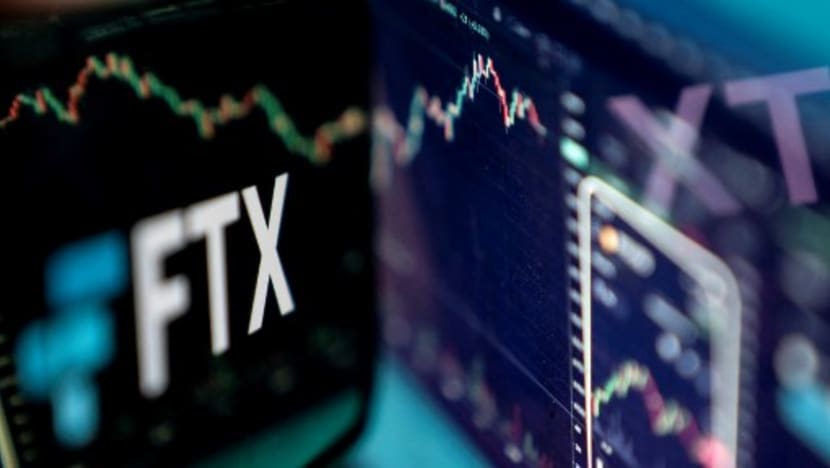FTX collapse: Why do firms invest in early stage companies in emerging sectors?
There is a need to balance risk and returns when deciding to invest in early stage companies in high-risk sectors such as cryptocurrencies, say analysts.

The logo of cryptocurrency exchange FTX. (Photo: AFP/Stefani Reynolds)
SINGAPORE: When it comes to investing in early stage companies, there are no high returns without the high risks involved, analysts told CNA after the collapse of cryptocurrency exchange FTX.
FTX started bankruptcy proceedings in the United States on Nov 11, with founder and chief executive officer Sam Bankman-Fried resigning his post.
The cryptocurrency exchange owes its 50 biggest creditors nearly US$3.1 billion (S$4.28 billion). About 1 million customers and investors were left in a lurch, including Singapore state investment firm Temasek, which said it would write down its US$275 million investment, Tiger Global Management and the Ontario Teachers’ Pension Plan, which also wrote off its investment.
INHERENT OR SYSTEMATIC RISKS
“As with all investments, risks are inherent,” said Professor Lawrence Loh, director of National University of Singapore (NUS) Business School’s Centre for Governance and Sustainability.
“Investing entities may need to get their feet wet in early stage companies to better understand the market trends and platform technologies – digital assets represent a most complex setting where there may be potential for game-changing innovations to drive economies and businesses."
Economist Walter Theseira, an associate professor at the Singapore University of Social Sciences, told CNA that “there are no high returns without high risks in early stage investing”.
“Up till the collapse of FTX and other cryptocurrency firms, the question that would have been posed to Temasek, if they had never invested, would have been: 'Why aren't you investing in this high return space?'
"With the benefit of hindsight, the question is now: 'Why did you invest in this high-risk space?'"
Assoc Prof Theseira added that these are essentially the same question – investment managers are criticised for missing out on potentially high returns when no investment is made, and for taking high risks if an investment fails.
These managers have a mandate to seek investment opportunities that fit a particular risk and potential return profile. Many of them would have included cryptocurrency and other emerging financial innovation companies in their mandate as high-risk, high-potential return opportunities.
“An investment manager with such a mandate would actually require a strong reason not to invest in cryptocurrency related companies, simply because of the immense amount of investment activity in that space,” he said.
Assoc Prof Theseira pointed to the two types of risk involved - idiosyncratic risk, meaning the risk specific to a particular company or investment, and systematic risk, meaning the risk that is general to the entire category of investments.
“Idiosyncratic risk is high because in general, crypto firms have been founded and run by persons with relatively little established track record,” he said, noting that FTX is a good example of this.
Systematic risk is also high, as the technology itself has no established profitable use case yet beyond financial speculation, explained Assoc Prof Theseira.
“Even if crypto technology does have a profitable use case, it's also by no means certain that the profit will justify the current scale of investments, so that is the other element of systematic risk; you might not lose your investment, but you might get a much lower return than you were hoping for," he added.
"ACTING APPROPRIATELY IN INVESTING"
Despite the FTX fiasco, there are still merits in investing in early stage companies in the digital token ecosystem, said Prof Loh.
He added that investing in such spaces may not be for everyone, particularly retail investors. But ignoring them entirely may be "regressive".
“You win some and you may lose some in any portfolio of investments – in the overall scheme of things, we have to see the broader performances,” he said.
"It will take more than an FTX fiasco to write off the need to invest in early stage companies that advance the digital token ecosystem including cryptocurrencies," he added.
Large investment firms need to invest in every major emerging investment asset class that is available, pointed out Assoc Prof Theseira.
This is because it is necessary to diversify the investment portfolio and also to have exposure to emerging categories which could be important.
“I think the FTX debacle doesn't change the underlying question: Is it riskier to invest in the cryptocurrency space, or is it riskier to stay out of it?” he asked.
“Not looking into such investments means accepting the risk of staying out, which is that your portfolio could miss out on a potentially high return, transformative industry.”
REDUCING RISKS
According to Prof Loh, good governance and full due diligence continue to be the bedrock for investment decisions – more so for volatile and unregulated spaces associated with digital tokens like cryptocurrencies.
“Institutional investors should have the capabilities and resources to perform such governance and diligence functions,” he said, adding that the cryptoeconomy is currently in a "state of flux" after recent high-profile controversies.
“It will take some time for the dust to settle – a progressive and rational approach in regulation especially across borders will help to stabilise the situation so that we can focus on the innovations and benefits and not be saddled with the hiccups.”
Assoc Prof Theseira said that one can attempt to reduce idiosyncratic risk through due diligence.
However, if the space is "full of high-risk firms" because there are few founders with established track records, and if management practices are generally questionable because the practice of most founders is to operate with little controls, there is little one can do.
“But when you have a popular crypto platform like FTX, with a distinguished list of early stage investors, and which has a good narrative around it, it's easy to ignore the concerns you have about high idiosyncratic risk," he said.
“In the end, the only way to avoid all risk is to simply not invest at all, which also means assuming the risk that your funds will be eroded by inflation steadily. The trick really is to get onto the frontier of balancing risk and return,” he added.

















